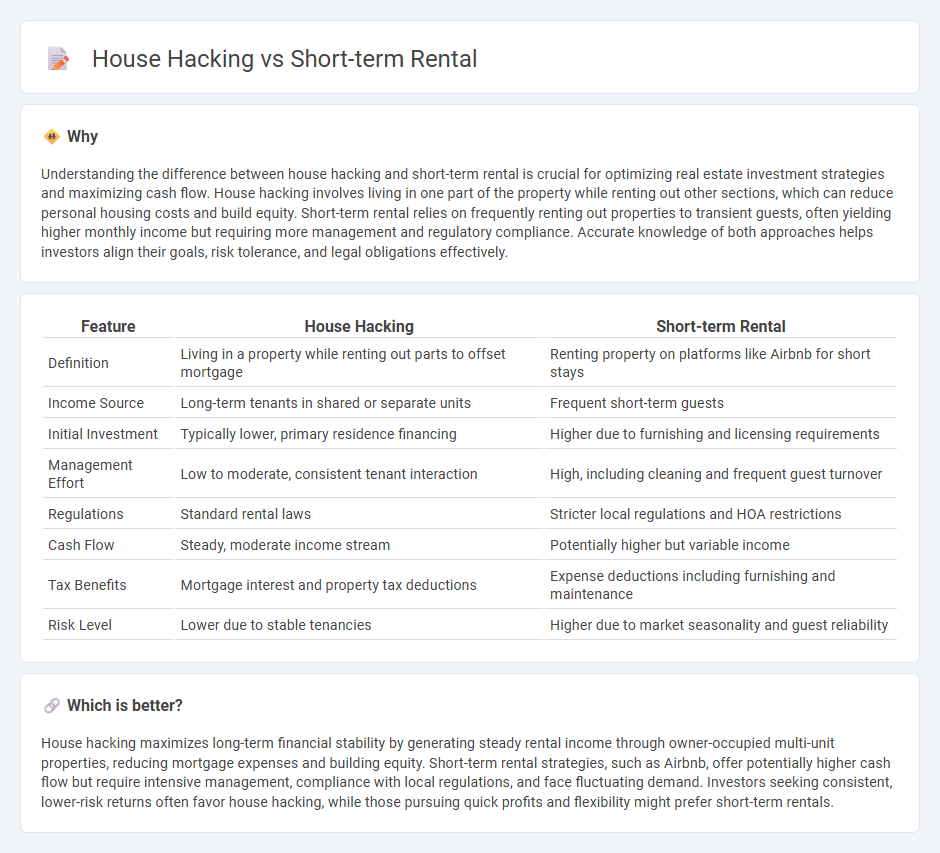
House hacking leverages owner-occupied properties to generate rental income, often by renting out individual rooms or units, optimizing cash flow and building equity simultaneously. Short-term rentals capitalize on platforms like Airbnb to offer transient accommodations, typically yielding higher per-night rates but requiring more active management and compliance with local regulations. Explore the advantages and challenges of both strategies to determine the best fit for your real estate investment goals.
Why it is important
Understanding the difference between house hacking and short-term rental is crucial for optimizing real estate investment strategies and maximizing cash flow. House hacking involves living in one part of the property while renting out other sections, which can reduce personal housing costs and build equity. Short-term rental relies on frequently renting out properties to transient guests, often yielding higher monthly income but requiring more management and regulatory compliance. Accurate knowledge of both approaches helps investors align their goals, risk tolerance, and legal obligations effectively.
Comparison Table
| Feature | House Hacking | Short-term Rental |
|---|---|---|
| Definition | Living in a property while renting out parts to offset mortgage | Renting property on platforms like Airbnb for short stays |
| Income Source | Long-term tenants in shared or separate units | Frequent short-term guests |
| Initial Investment | Typically lower, primary residence financing | Higher due to furnishing and licensing requirements |
| Management Effort | Low to moderate, consistent tenant interaction | High, including cleaning and frequent guest turnover |
| Regulations | Standard rental laws | Stricter local regulations and HOA restrictions |
| Cash Flow | Steady, moderate income stream | Potentially higher but variable income |
| Tax Benefits | Mortgage interest and property tax deductions | Expense deductions including furnishing and maintenance |
| Risk Level | Lower due to stable tenancies | Higher due to market seasonality and guest reliability |
Which is better?
House hacking maximizes long-term financial stability by generating steady rental income through owner-occupied multi-unit properties, reducing mortgage expenses and building equity. Short-term rental strategies, such as Airbnb, offer potentially higher cash flow but require intensive management, compliance with local regulations, and face fluctuating demand. Investors seeking consistent, lower-risk returns often favor house hacking, while those pursuing quick profits and flexibility might prefer short-term rentals.
Connection
House hacking allows homeowners to generate income by renting out part of their property, which directly complements the short-term rental market focused on maximizing rental returns. Utilizing platforms like Airbnb or Vrbo, owners can rent individual rooms or units for brief periods, increasing cash flow and offsetting mortgage costs. This strategy leverages property utilization efficiently, blending long-term investment benefits with the flexibility of short-term leasing.
Key Terms
Cash Flow
Short-term rental properties generate higher cash flow due to premium nightly rates and frequent tenant turnover, while house hacking offers steady monthly income by renting out parts of a single-family home to reduce living expenses. Short-term rentals require active management and face market seasonality, whereas house hacking delivers more predictable and consistent cash flow with lower operational demands. Explore detailed strategies and financial comparisons to maximize your rental income potential.
Occupancy Rate
Short-term rental properties typically achieve an occupancy rate ranging from 50% to 70%, fluctuating based on location and seasonality, while house hacking often maintains near 100% occupancy due to owner residency. High occupancy rates in house hacking translate to consistent cash flow and reduced vacancy risk, contrasting with the variable income stream of short-term rentals. Explore detailed occupancy strategies to optimize your real estate investment returns effectively.
Tenant Management
Short-term rental demands constant tenant management, including frequent guest communication, scheduling cleanings, and handling quick turnovers to maintain high occupancy and positive reviews. House hacking involves longer-term tenants, requiring less frequent interaction but emphasizing lease agreements, rent collection, and tenant retention strategies. Explore effective tenant management techniques to optimize your rental income and tenant satisfaction.
Source and External Links
Short-Term Rental Overview - This webpage provides an overview of short-term rentals, including their types and definitions.
Pennsylvania Short-Term Rental Laws: 2025 Guide - This guide summarizes the laws and regulations regarding short-term rentals in Pennsylvania.
Short-Term & Temporary Housing - Extended Stay America offers temporary housing solutions that feel like home, providing comfort during relocation or travel.
 dowidth.com
dowidth.com